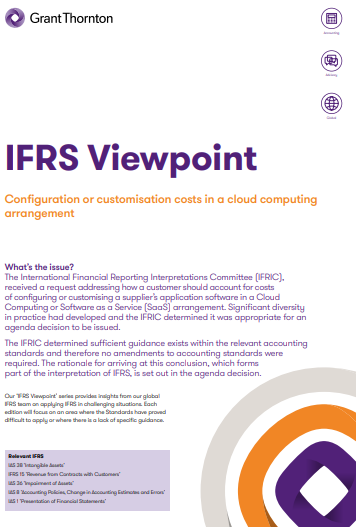
The IFRIC determined sufficient guidance exists within the relevant accounting standards and therefore no amendments to accounting standards were required. The rationale for arriving at this conclusion, which forms part of the interpretation of IFRS, is set out in the agenda decision.
What is cloud computing?
Cloud computing is a confusing term that can be interpreted in a variety of ways, with differing consequences. Generally, computing arrangements can be broken into three broad categories.
1. Licensed software on premise
2. Licensed software off premise
3. Software as a service (SaaS)
The IFRIC agenda decision issued in March 2021 relates to this third category SaaS. In this category, the purchaser has been granted a right to access software and use it for their purposes. No right to transfer the software to another platform or to control the method of operation of the software is granted beyond what is contractually agreed.
What was the diversity in practice?
In its consultation on the issue, the IFRIC identified various approaches to customisation and configuration costs for cloud computing arrangements were utilised by companies depending on internal policy. These policies varied from expensing all costs in full to capitalisation of all costs in full, with most entities taking a more nuanced approach in their capitalisation policy and differentiating between expenditure with different underlying fact patterns.
In its agenda decision, the IFRIC determined a nuanced approach indicating IAS 38 ‘Intangible Assets’ was appropriate depending on the facts and circumstances of the projects undertaken and the rights and obligations of the entity as it relates to the individual elements of the projects.
Many entities will find their historic policies, though nuanced, will not conform to the principles as described by the IFRIC.
What does the agenda decision require?
The agenda decision requires management to capitalise those elements of expenditure that meet the definition of an intangible asset as defined by IAS 38 and recognise any additional amounts as an expense as the entity benefits from the expenditure – either by applying IAS 38 or applying another accounting standard. The decision clarified:
- the nature of expenditure that met the definition of an intangible asset
- the methods of differentiating between intangible assets and expenses, and
- the pattern in which the entity benefits from expenditure that does not qualify as an intangible asset.
Intangible asset vs expense
The IFRIC identified the disparity in practice was caused in part by confusion over the definition of an intangible asset and whether costs incurred met the criteria to be recognised as an intangible asset.
Definitions
-
Configuration costs were defined as ‘involving the setting of various ‘flags’ or ‘switches’ within the application software, or defining values or parameters, to set up the software’s existing code to function in a specified way’.
-
Customisation was defined as ‘involving modifying the software code in the application or writing additional code. Customisation generally changes, or creates additional, functionalities within the software.’ (emphasis added).
To assist with this confusion, the IFRIC identified two general ‘buckets’ of implementation cost incurred in a cloud computing arrangement; configuration costs and customisation costs.
An intangible asset is recognisable when it has the following characteristics:
- the asset is separable and transferable from the entity, or arises from contractual or other legal rights
- the asset is a resource controlled by the entity, and
- the entity has the power to obtain economic benefits flowing from the resource and restrict the access of others to those benefits.
From the above, the IFRIC communicated it is typical the software underlying a cloud computing arrangement is not transferred to a customer, and the setting of flags (ie configuration) in third party software does not provide a separable and transferable, or contractual, right to an asset as no asset that is separate from the software has been created.
The IFRIC also addressed the potential for customisation costs to meet the definition of an intangible asset. The IFRIC identified in certain situations, customisation costs may be required to be capitalised. This will be applicable where the entity has engaged resources (internal or external) to create software to which the entity retains intellectual property rights. We note this is generally not the case where code is created for operation ‘in the cloud’ as such additional enhanced functionality generally remains the property of the third part cloud computing provider.
Error or change in policy?
The IFRIC has identified disparity in practice exists and has issued an agenda decision on the basis of clarifying which policies are acceptable. In our view, it is appropriate in this instance to consider the correction of any related recognition and measurement arising from the application of the agenda decision as a change in accounting policy as opposed to a restatement due to an error.
While the form of restatement of prior periods is similar, it is appropriate in this instance to refer to a change in policy as a result of the IFRIC agenda decision as opposed to a restatement due to a prior period error.
When should the policy be implemented?
For certain entities, the adoption of the new policy will result in minimal impact as a result of known limitations in the volume of contracts within the scope of the IFRIC agenda decision.
For other entities, the impact will be broader and may require significant projects to be undertaken to obtain, collate, and make judgements on the underlying information. It is therefore generally accepted the agenda decision may require effort to determine the impact of the agenda decision and adjust the financial statements of an entity; it may also be appropriate for entities to expedite the adoption of a revised policy in response to the agenda decision.
A general expectation has been communicated that all entities will have adopted the new policy by 31 December 2021. We do note, however, that accuracy is paramount. While an entity should seek to expedite adoption, corporate governance will require appropriate controls to be implemented to ensure accuracy in adoption which may require a more deliberate approach to ensure material accuracy.
Want to know more?
Additional considerations and practical application to navigate the process can be found in the full Viewpoint.
Applying IFRSs in challenging situations
Our IFRS Viewpoint series provides insights from our global IFRS team on applying IFRSs in challenging situations. Each edition focuses on an area where the Standards have proved difficult to apply or lack guidance.
We hope you find the information in this IFRS Viewpoint helpful in giving you some insight into a complex IFRS area. If you would like to discuss any of the points raised, please speak to our experts Christoph Zimmel and Rita Gugl.


